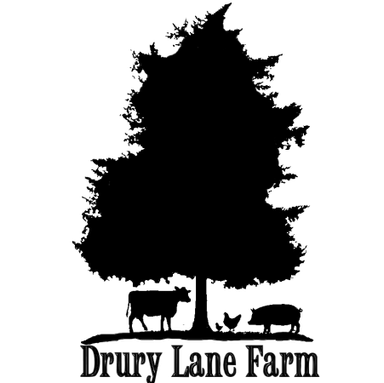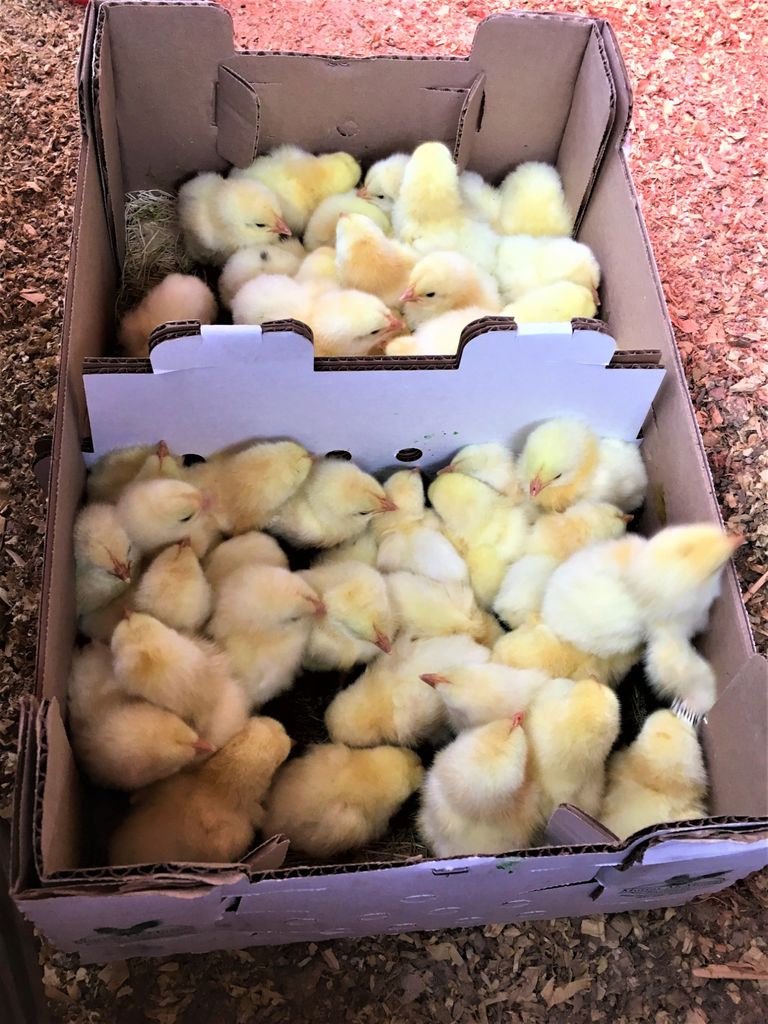
It's Broiler Season!
From Peeps to Pasture.
We thought you would enjoy seeing how our sweet little peepers get their start in life here on the farm. First thing we do is go on the hatchery's website and order the chicks, choose which hatch date best fits into our brooder and pasture rotation schedule, then wait for their arrival. When the hatch date comes around our little "Fuzzballs" are packed tightly in a box with holes in the sides and on top so they can get plenty of air. The closeness of their bodies keeps them warm during transit. Immediately, they are shipped to our local post office where we pick them up and bring them home. This could be anywhere from one to two days travel time. We make sure the brooder is ready with a heat lamp on to keep the temperature around 95 degrees for the first week of their lives, and fresh water and feed. Next, we take them out one by one, count and inspect them, and watch them for a while to make sure they have found the water and are drinking well. Most of the time these little bundles of energy practically jump out of the box when the lid is removed. They can't wait to run around, stretch their legs, and scratch and peck at anything and everything. What a joy they are to watch!
As they continue to grow in the brooder, the heat lamp is turned off and we can now open the top door to let in the sunshine. This helps them acclimate to the outside temperature. We watch them carefully to make sure they are not getting too cold. If we see them all huddled in the corners together...they are trying to get warm, so we close the top door a bit to help keep in some warmth. The chicks will be in the brooder for about 4 weeks, sometime 3 depending on the outside weather, before we put them in our floorless shelters out in the pasture area. These floorless shelters are not to confine them, but to protect them from predators. Jumbo Cornish Cross broilers would not be able to move quickly enough during a time of danger to get out of harm's way. This is why we need to provide them a place of shelter and safety. We move these floorless shelters once a day, sometimes twice, to fresh pasture. It's so fun to watch the chicks get excited over the fresh grass, the bugs, and all the fresh air they can breathe in. "Moving Day" is a glorious day for a broiler chick!
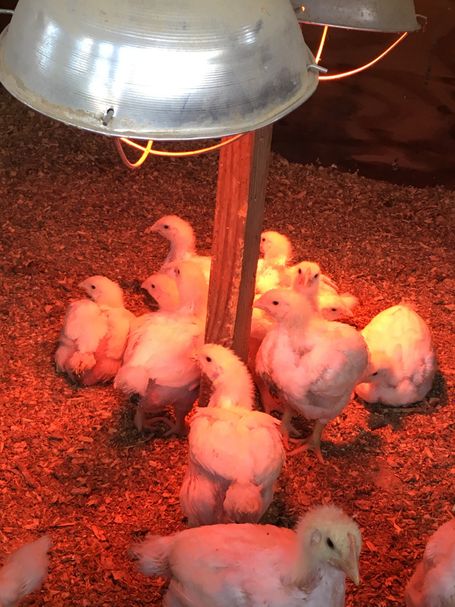
These broiler chicks are soaking up the heat from the heat lamp. Ahhh...it feels soooo good! They are not very old, extremely alert, and really healthy.
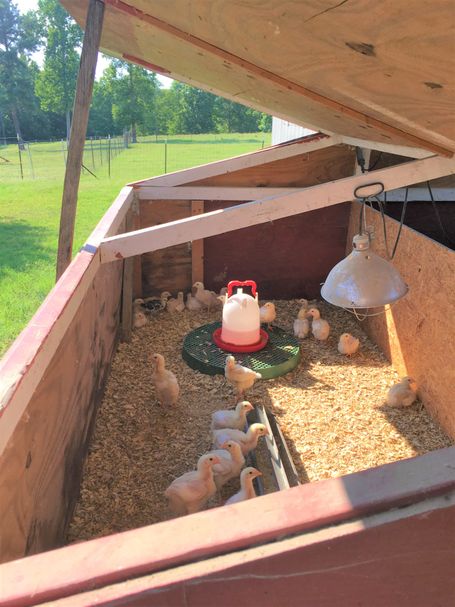
Here's the brooder with the top lid up letting in all that sunshine. These chicks are loving it! However, the fate of the bugs that fly inside is not always good. These little fuzzy balls of cuteness love chasing and eating flying "creatures" of all sizes.
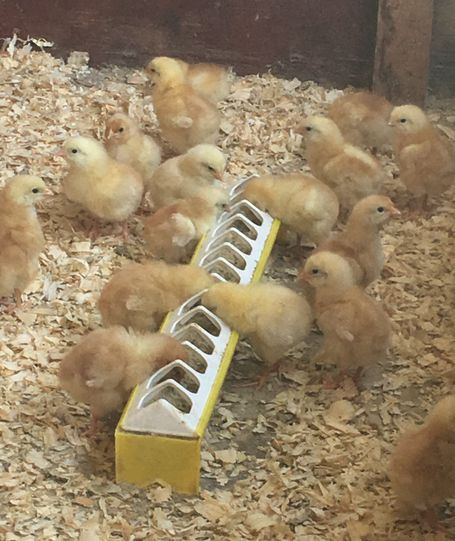
The first tasting of their chick starter feed. They sure are enjoying it! Nothing like eating with your whole face in your plate. Trust me, their heads are not stuck. It just looks that way!
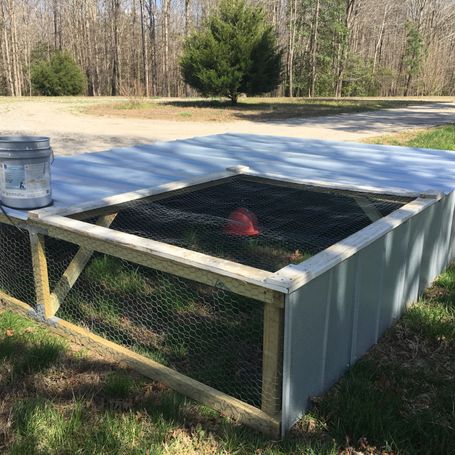
This is a floorless shelter made for the broiler's protection...NOT confinement. They can still access all the fresh bugs, worms, seeds, and grass they want while being protected from fox, coyote, opossum, raccoon, or the hunting dogs that cross our property during hunting season.
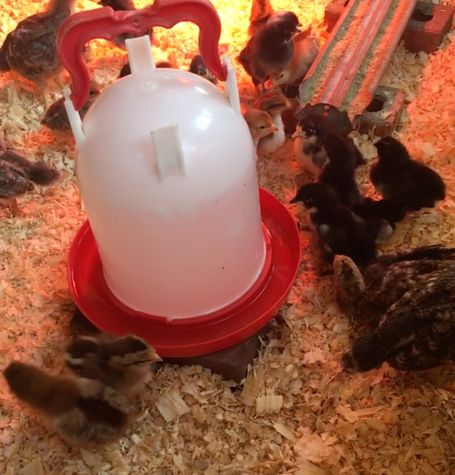
This colorful, fluffy, family are our new layers when they were just days old. There are all kinds of brown egg laying, large body, heritage breeds, soon to be hens, in this active bunch. What a fun group of chicks to watch. They didn't just mosey around from one place to the other...they "flew-run"! (Not really a word...but it fits.)
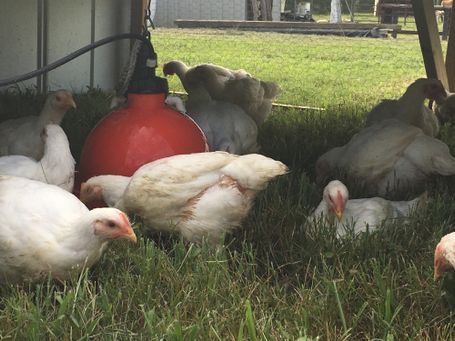
It's "Moving Day" and the grass never felt so refreshing! Many times, right after they are moved, they will just plop themselves down in the fresh grass and cool off their underbellies. It feels...so...good!
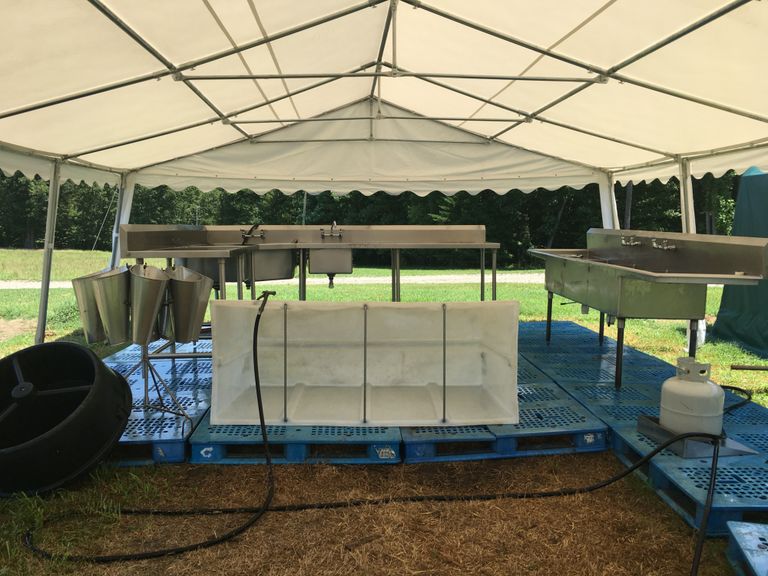
From Pasture to Product.
Processing Day is a very busy, very long day...but such a rewarding day! The day starts early as Bob heads out to hook up the outdoor boiler to the scalder, feed and water animals so we don't have to stop in the middle of processing to do that, then he and Jason connect the water up to the sink faucets and make sure all the drainpipes are secure and tight. It's then time to come in for breakfast and coffee, then back out to scrub down and disinfect all surfaces and utensils. We are then ready to get started!
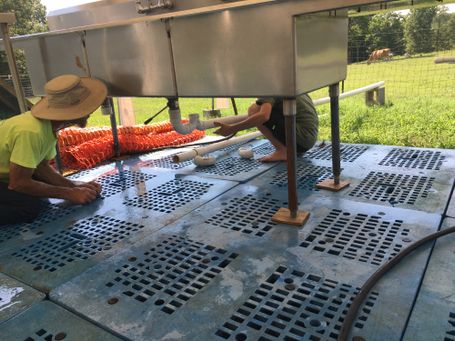
Bob is supervising Jason's plumbing job. It's coming together nicely!
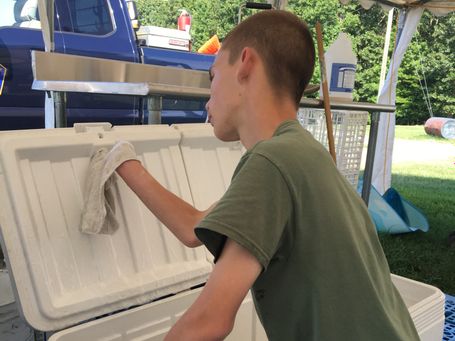
Jason is such a great cleaning partner! He takes his time and cleans every nook and cranny of these coolers. So important! We place the finished chickens in the cooler with ice and water to chill them quickly. They remain in the coolers until we drain them, bag them, and place them in the freezer.
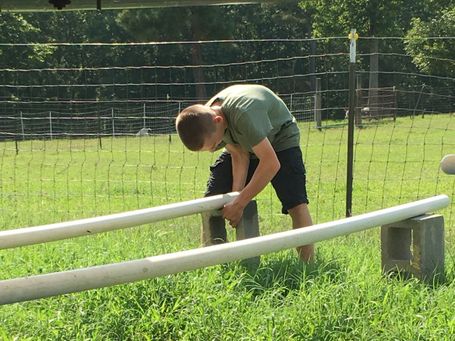
All pipes are directed away from the processing area and towards the inner paddock field. This way we don't waste water, and we irrigate the pasture grass all at the same time. Doing this also helps keep the processing area a little more dry.
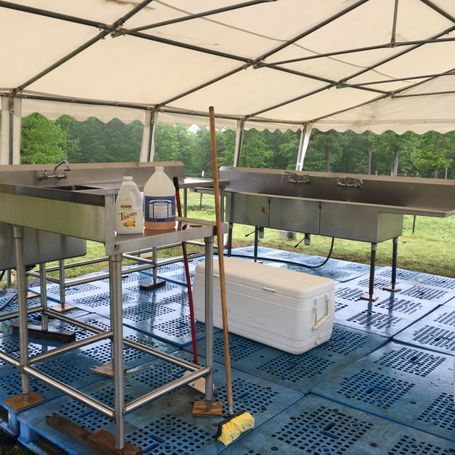
Our open-air, outdoor processing facility is all clean and ready to turn our broilers into a healthier than organic product for our customers.
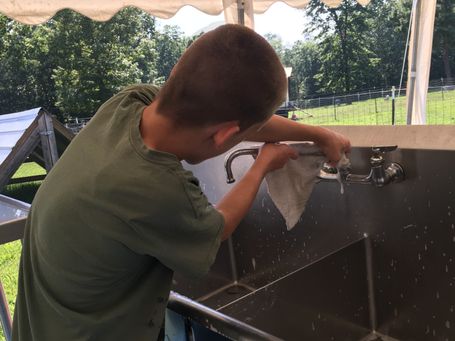
Cleaning and disinfecting every surface area, including faucets, and utensils, is extremely important and contributes to a healthy and safe final product. We never use chlorine or chemical laden soaps. Instead, we use a safe essential oil cleaner called Thieves from Young Living and sometimes Dr. Bronner's Peppermint soap.
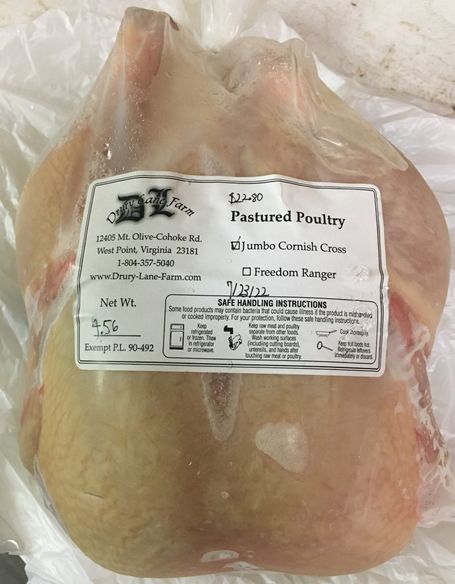
And here it is...all frozen and ready for purchasing. It's some of the best tasting chicken around...with no saltwater pumped into the meat, and no chlorine soaking baths. It's just pure, healthier than organic, chicken you can feel good serving to your family.
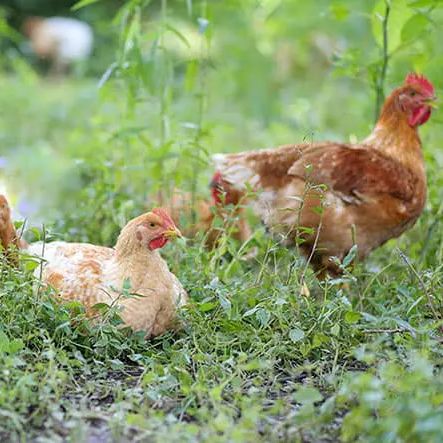
These are the Freedom Ranger Color Yield...our choice for their ease of processing. The Color Yield has white colored feathers next to their body instead of dark brown which makes cleaning the bird and getting all the feathers off during processing much easier. This picture shows a hen on the left, and a rooster on the right. They are very handsome looking broiler birds!
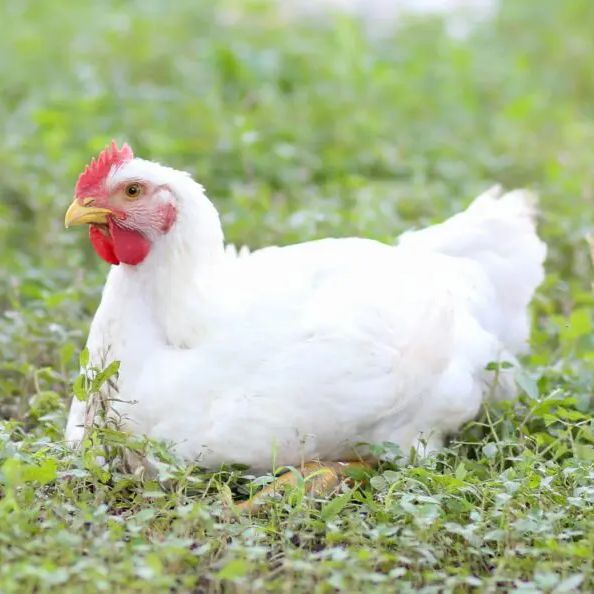
Here is a picture of a Jumbo Cornish Cross...sometimes referred to as the Cornish Giant. It has white feathers all over its body allowing these birds to clean up beautifully...making for a nice, packaged product.
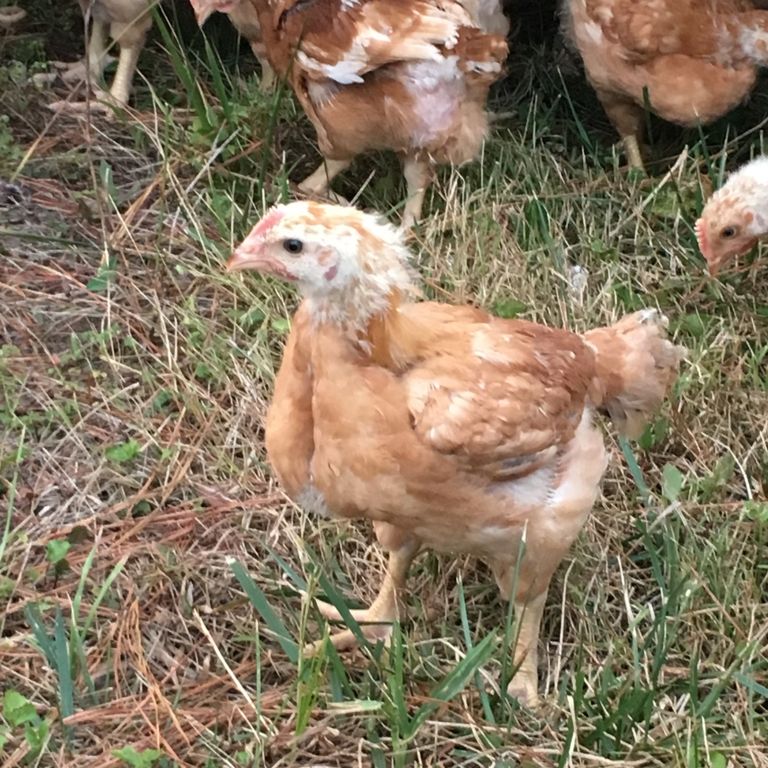
This little four-week-old Freedom Ranger has just been put out on pasture for the first time. This batch was put out in our front pasture which has pine trees running along the edge. They started scratching and nibbling at the pine straw right away!
Freedom Ranger ~ What's the Big Deal?
Back in our grandparents and great-grandparents day they would raise "yard birds" for both eggs and meat. These chickens were heritage breed hens that would not only lay big, brown eggs for their breakfast every day, but also had a large body that could be processed, cooked, and would provide enough meat for a special occasion or a "once in a while" Sunday dinner. Here on Drury Lane Farm, we raised these heritage breeds of chickens for our egg production. They are hardy and can tolerate most weather conditions, and they consistently lay large eggs that provide us, our family, friends, and the community with plenty of eggs to eat. When these heritage breed hens become too old and their egg laying has slowed down or stopped, we then process them and use them as stewing hens. These older stewing hens are really good for slow cooking in water for a long period of time, and they make some amazing broth!
For our meat birds, also called broilers, we raise two kinds of breeds. One is the Jumbo Cornish Cross, the other is the Freedom Ranger. The Jumbo Cornish Cross is the chicken you will get when you go to a restaurant or the grocery store. This broiler was created to provide a lot of meat (mostly breast meat) in a very short time. Jumbo Cornish Cross grow out to 6lbs. in about 6.5 - 8 weeks. That's fast growing, Folks! This means you can have a large size bird with lots of meat that was completely grown out in a short amount of time. This is why commercial chicken farms choose the Jumbo as their choice of breed. Another plus for using this breed in a commercial setting is because Jumbo Cornish Cross chickens don't move around much, so the space that is needed to grow out these birds is minimal. They just basically sit at the feeder and eat...getting up once in a while to drink water. They also don't tolerate cold weather well, so growing them indoors as in a commercial chicken farm benefits this breed. Jumbo Cornish Cross provide a lot of juicy, plump, breast meat and tender skin...just like most people have become accustomed to. The problem with raising Jumbos is their tendency for leg and heart problems due to the fast rate of growth. But for the most part, taking these birds and putting them in floorless shelters for their protection and giving them access to fresh pasture daily, fresh air, and fresh water, makes these broilers grow out to provide a bulk supply of delicious meat. Great for larger families and those of us who love leftovers!
As for the Freedom Rangers...these broilers are in a class all their own. They are a mix between an American and European heritage bird that was designed specifically for meat production. They grow out at a much slower rate than the Jumbos, reaching 6lbs. in about 9-11 weeks. This means there is very little, if any, leg and heart problems, and they have a very high survival rate. Freedom Rangers are very cold hardy, extremely active, love to scratch for bugs and grubs, nibble on grass and weed seeds, and dust bathe in the sunshine...just like "normal" chickens do. Though they may not provide a bulk supply of meat with that huge, plump, breast meat, their meat is very succulent and tender, has an amazingly intense flavor, and is considered top quality. Freedom Rangers provide a much higher level of Omega 3 yellow fat compared to other broilers, and their fat is low in saturated fat. Most ethnic food markets seek out the meat of the Freedom Ranger to put in their special dishes.
Which one is better? That is for you to decide. What is right for your family? What flavor do you enjoy the most? We encourage you to try both of them and decide for yourselves. Right now, a couple of our customers are trying both the Jumbo Cornish Cross and the Freedom Ranger, doing a side-by-side comparison, and they will let us know what they and their families notice about each different breed. We'll be sure to post an update on what they discovered!
We need your consent to load the translations
We use a third-party service to translate the website content that may collect data about your activity. Please review the details and accept the service to view the translations.
